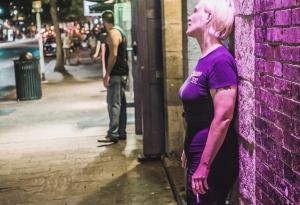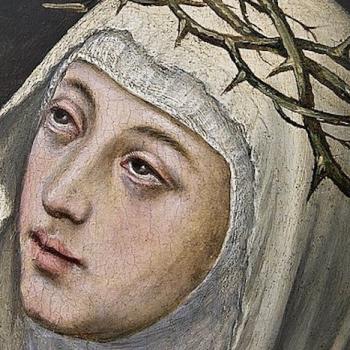
The art of forgiveness implies a return. A turning back with graciousness to the moment of harm, to the one who caused the hurt. Sometimes this is possible, and the return initiates a story of catharsis.
But sometimes we can’t return to all that. Sometimes we shouldn’t. The trauma involved in some hurts makes return simply too much to ask. Maybe the one who hurt me is unsafe. Maybe they haven’t stopped hurting me. Their ability to return with me there may be compromised by their mental health. Perhaps they are no longer alive. Or perhaps they are simply uninterested in my forgiveness.
Whatever the reason, the art of forgiveness sometimes cannot involve a return to the person and the event. In those cases, it might involve a moving on. In difficult cases like those, even the act of forgiving can begin in grief for the path we cannot take.
The Measure of Forgiveness
This past Sunday, my friend Demery preached a sermon on forgiveness. She preaches monthly at St. Julian of Norwich, the church in North Austin that my family and I attend. Demery took us through the tough portion of the sermon on the plain in Luke, when Jesus tells the crowd to turn the other cheek. The reading concluded with that bit about forgive and you will be forgiven, and the shaking up and circling back round of measures. More on that below.
Demery noted the challenges of the passage, and the ways it could lend itself to unhealthy and unholy readings like the situations I outlined above. Returning to an abusive relationship doesn’t sound like gospel to me. Or to Demery.
Conventional homiletical wisdom tends to meet this challenge with a kind of willed offering off forgiveness that doesn’t take shape in any discernible way. Forgiveness is limited to the will to forgive, to let something go. Forgive anyhow, as a generous gift to yourself. Put that burden down.
That is wise and good advice, in the proper context. I recommend that anyone working on a forgiveness project explore that wisdom with a trusted friend or mentor.
Maya Angelou’s Pay-It-Forward Forgiveness
But I heard something new in the sermon.
Demery cited the wisdom of Maya Angelou, who once told Oprah Winfrey about her pay-it-forward model of forgiving. When a person lacks the capacity—for whatever reason— to be forgiven, Angelou said that she would sometimes make a gift somewhere else in that person’s name. Some unsuspecting and uninvolved person would receive an act of generosity. No one would be any wiser, but Dr. Angelou would name her own act as a “giving for”—giving forward—that released that old damage.
In some ways, a single act of forgiveness that is all about my purity of intention is too little and too much to demand. Too much, because some harms don’t go away that easily. Too little, though, because a 1:1 transaction of offense to forgiveness fails to open up a broader and richer exchange of graciousness. Dr. Angelou’s method is surely on to something. It expands the community of grace, even as it locates that graciousness in a bodily act. It doesn’t head back directly to where it began: it runs on a diagonal. I call one name, even as I angle off to another.
How to Give a Gift
Forgiveness is a type of gift, as the root of our German-based English word shows.
Back when I was beginning my graduate level theological studies, I read an essay by my mentor, John Milbank, called “Can a Gift Be Given?” At the time, a debate was circling in the philosophy and theology worlds about the true nature of a gift. One of the points Milbank makes in that essay is that a hyper-focus on intention can ruin any gift. Did I mean it when I gave this? Was I hoping for something from you in return?
Maybe we can let that go, he suggested. Instead of worrying over my intentions, I can take joy in the community of graciousness that my imperfect gift-giving gets to share in.
The best gifts exchanges don’t stay closed in a connection of two. They expand, as generosity takes root and expands. What if I forget that I “owe” you lunch, because I’ve noticed someone in need of a bite to eat? Maybe I “gifted” you by giving to them. In that case, what emerges is a community of generosity based in a rather anarchic model of gift exchange.
When the Gift Goes Feral
Now substitute the word “forgiveness” for gift in that last sentence, and you’ll see where I’m heading.
Dr. Angelou’s small experiment in forgiveness reminds me of that essay that was so formative for my theological thinking. Maybe true forgiveness is less like a purely intentioned return to a hard moment, and more like a disorderly white elephant gift exchange. We all bring our weird acts of mercy, no one knows who’s going home with what, and when the night is over we’ve laughed so much that all we can remember are the good stories. I’ve received a measure of grace. I passed along a measure. And then in the end we find that our laps are all overflowing with it, just like the passage in Luke says. There’s something a little anarchic about this sort of forgiveness, diagonalizing beyond its original measure.
I hope the heavenly gift of forgiveness is a little like that. Rev. Demery and Dr. Angelou and others, inviting me into a feral exchange of graciousness, and after a bit I’m laughing and sharing and I can’t even remember what I needed to let go of.
I’m grateful to my colleague Nathan Jennings for conversation over many years about God’s gift economy.










